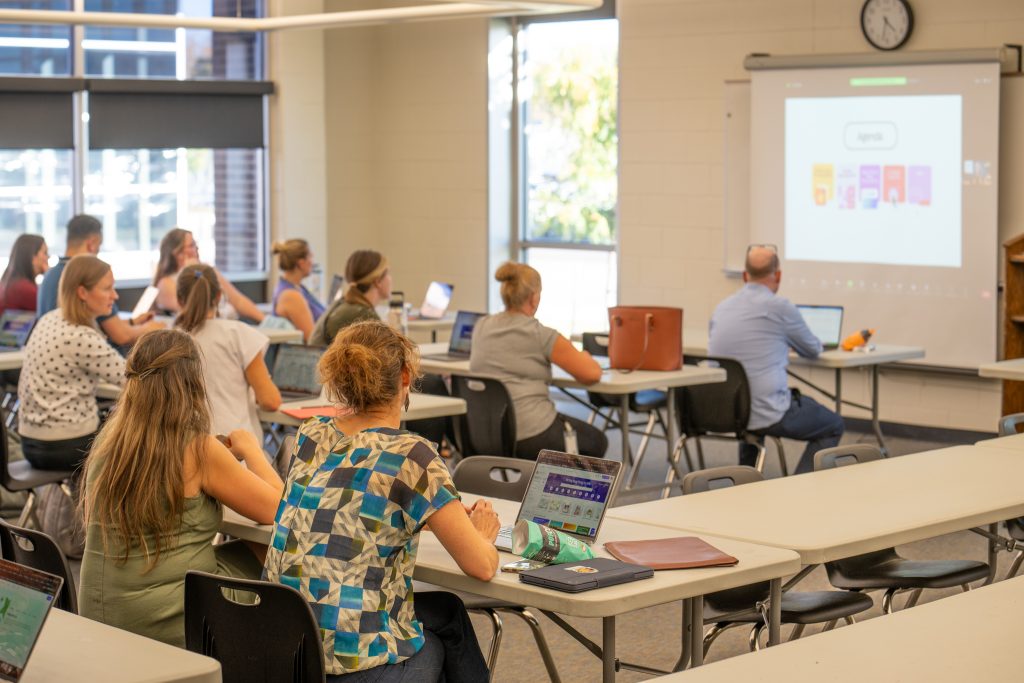
In today’s rapidly evolving world, St. Vrain Valley Schools is committed to preparing students for success in an increasingly complex and globalized environment. To achieve this, St. Vrain has launched ‘Exploration AI,’ a year-long professional development program designed to equip educators with the knowledge and tools needed to integrate Artificial Intelligence (AI) technology into their teaching practices and curricula.
“Exploration AI was conceived through a collaboration between the Office of Professional Development, District Technology Services, and the Office of Assessment and Curriculum. Each department contributed its unique expertise,” said Jason Kelsall, Learning Systems Strategist for St. Vrain Valley Schools. “The Office of Professional Development focused on educational needs, District Technology Services handled the technical infrastructure, and the Office of Assessment and Curriculum ensured alignment with educational standards.”
The program aims to provide educators with an understanding of AI fundamentals, including machine learning, natural language processing, and data analytics. They receive hands-on training with various AI tools and learn how to effectively implement them in educational settings. In addition, they will discover innovative ways to use AI for formative assessments that enhance learning and explore AI’s potential benefits in special education.
Teachers and staff have different reasons for participating in Exploration AI. “My goal is to learn how to utilize AI in a way that encourages students to think critically and learn how to use AI effectively,” said David Wrisley, Media Consultant at Longmont High School. “I am curious about where the future of AI in schools is going, and I want to have an advantage.”
Exploration AI has already produced success stories in St. Vrain Valley Schools across all grades and subject areas. In math classrooms, AI-generated discussion questions have enriched vocabulary learning experiences. Elementary music teachers have used AI-generated accompaniment tracks to enhance self-assessment and reflection. Secondary social studies teachers have employed AI tools for brainstorming and planning in virtual classrooms. AI has supported social and emotional learning exercises as well. Conflict resolution lessons in 5th-grade classrooms have been made interactive and relatable using AI-generated role-playing scenarios.

The program also includes monthly EdCamp Pop-Up sessions and the Professional Learning Network (PLN) which encourages teachers to collaborate, discuss, and share resources and strategies. These sessions aim to enhance educators’ teaching tactics and their understanding of AI’s countless applications.
St. Vrain has long-term goals to build on the success of Exploration AI by expanding the program in future years. “This could include deepening the AI curriculum, offering advanced training sessions, and potentially integrating AI initiatives into other school-wide programs,” said Kelsall. Each school is also identifying an “Exploration AI champion” who will spearhead AI integration efforts. Teachers who become Exploration AI champions will gain leadership skills that can be invaluable for their professional development and for driving change within their schools.
Exploration AI in St. Vrain Valley Schools represents a dynamic shift in education, where educators are not only keeping pace with technological advancements but leading the way. With over 300 participants from more than 50 different schools and programs, the impact of this program is already evident. As educators gain proficiency in AI, students will benefit from enhanced learning experiences, preparing them for a future where AI plays an ever-increasing role.
